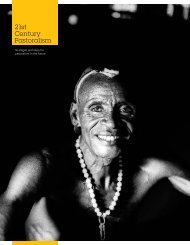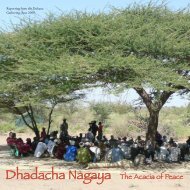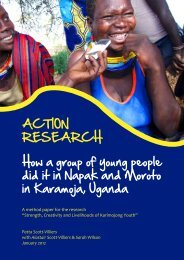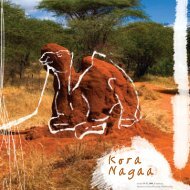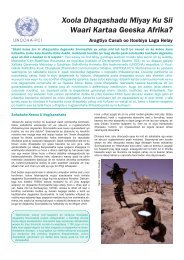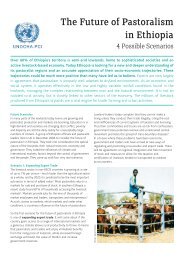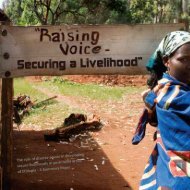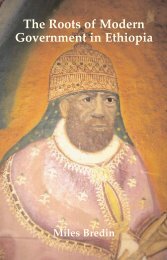Download PDF (212Kb) - the Website of the Pastoralist ...
Download PDF (212Kb) - the Website of the Pastoralist ...
Download PDF (212Kb) - the Website of the Pastoralist ...
Create successful ePaper yourself
Turn your PDF publications into a flip-book with our unique Google optimized e-Paper software.
Vulnerable Livelihoods in Somali Region, Issues Paper, March 2005<br />
meals daily. Parents protected <strong>the</strong>ir children from<br />
hunger by rationing <strong>the</strong>ir own food consumption more<br />
severely. Several people were displaced to urban<br />
areas. In Kebribayah one household divided "due to<br />
hunger", with <strong>the</strong> wife and children moving to Jigjiga<br />
until <strong>the</strong> crisis had passed.<br />
People emphasised that <strong>the</strong>y tried to help each o<strong>the</strong>r,<br />
but <strong>the</strong> severity <strong>of</strong> <strong>the</strong> drought undermined informal<br />
assistance. "Everyone in this community is at <strong>the</strong><br />
same level <strong>of</strong> income, so we couldn't help each o<strong>the</strong>r<br />
this year." In Gashamo, where 67% <strong>of</strong> households<br />
surveyed had paid zakaat contributions in 2003, only<br />
3% managed to pay in 2004. People in Kebribayah<br />
said receiving zakaat requires patronage connections<br />
to wealthier people: "Zakaat is for rich people and<br />
those who know <strong>the</strong>m; it is not for people like us."<br />
Food aid was distributed as a drought relief measure<br />
in 2003 and 2004. In Gashamo, 72% <strong>of</strong> households<br />
had received some food aid at least once in 2004. In<br />
Kebribayah, <strong>the</strong> figure was much lower, at 42%, and<br />
in Jigjiga, only 10%. No households had participated<br />
in food- or cash-for-work. Informal redistribution <strong>of</strong><br />
food aid at various levels reduced <strong>the</strong> food received<br />
by each household. One household <strong>of</strong> 3 adults and 6<br />
children was given 50kg <strong>of</strong> wheat as food aid in 2003,<br />
but only three cupfuls <strong>of</strong> wheat in 2004, about 1½ kg.<br />
Attitudes to food aid were more <strong>of</strong>ten negative than<br />
positive. Many people complained about receiving<br />
food aid in <strong>the</strong> form <strong>of</strong> wheat, which is unfamiliar and<br />
unpopular. Both pastoralists and agro-pastoralists<br />
suggested that food aid is an inappropriate and<br />
inadequate response to <strong>the</strong>ir problems, and that more<br />
sustainable forms <strong>of</strong> livelihood support are needed.<br />
What people said about food aid:<br />
• "We could not eat it because it was dry and hard<br />
to eat. So we gave it to our livestock."<br />
• "When <strong>the</strong> food aid reaches <strong>the</strong> elders <strong>the</strong>y take<br />
half <strong>of</strong> it and <strong>the</strong> rest disappears. We don't know<br />
where it goes."<br />
• "What we need is help with reconstructing <strong>the</strong><br />
livelihood we used to live, not food aid.<br />
Restocking, veterinary facilities, health care,<br />
employment opportunities, education for our<br />
children - that's what is important to us."<br />
Photo UNOCHA<br />
Conflict and Governance<br />
Conflict and insecurity impact in multiple ways on<br />
lives and livelihoods throughout rural Somali Region.<br />
A disaggregated analysis is needed to understand<br />
<strong>the</strong> legacy <strong>of</strong> past wars (displacement, rehabilitation,<br />
contested territory); ongoing conflicts between clans<br />
(over access to resources, or blood feuds); militia<br />
activity; border disputes (mainly with Oromiya);<br />
livestock raiding; small arms proliferation; and "aabsi"<br />
(fear <strong>of</strong> conflict or attack, which restricts pastoralists'<br />
mobility along unsafe migration routes).<br />
In 14 <strong>of</strong> 200 rural households surveyed (7%), one or<br />
more members had lost <strong>the</strong>ir lives in violent conflict.<br />
Inter-clan conflicts <strong>of</strong>ten occur over access to grazing<br />
land or water points. Recent violent episodes have<br />
caused loss <strong>of</strong> property, livestock and lives. Several<br />
trucks carrying food or livestock have been attacked.<br />
In Kebribayah, many disputes are over farming land.<br />
In one case, two sub-clans quarrelled over land that<br />
had belonged to <strong>the</strong> community and was allocated by<br />
<strong>the</strong> elders. Tensions ran high and a man was killed.<br />
Relations between <strong>the</strong> two sub-clans remain tense.<br />
Traditionally, conflict resolution has been <strong>the</strong> role <strong>of</strong><br />
clan elders. In Gashamo and Kebribayah, people still<br />
turn to <strong>the</strong> elders to resolve conflicts in most cases. In<br />
Jigjiga town, <strong>the</strong> police are more <strong>of</strong>ten approached to<br />
resolve disputes, ahead <strong>of</strong> <strong>the</strong> elders.<br />
There is widespread disillusionment with <strong>the</strong> ability <strong>of</strong><br />
government at any level to improve living conditions<br />
in Somali region. Over 70% <strong>of</strong> respondents in all 3<br />
districts felt <strong>the</strong>y were not fairly represented in local,<br />
regional or federal government structures, and over<br />
80% felt <strong>the</strong>ir representatives were not representing<br />
<strong>the</strong>ir interests effectively.<br />
What people said about government:<br />
• "No-one talks to us to ask what we need. The<br />
government does not exist here."<br />
• "What government are you talking about? We<br />
only see <strong>the</strong> army, if that's what you mean."<br />
• "We do not know if we have representation. It<br />
seems no-one is conveying our problems to <strong>the</strong><br />
government."



